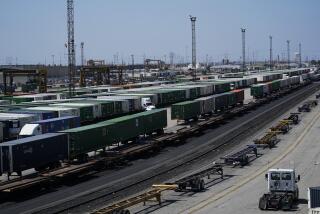Court Disallows Drug Tests for Rail Workers
- Share via
SAN FRANCISCO — In a blow to drug-testing programs, a federal appeals court today struck down a regulation that made 200,000 railroad workers subject to mandatory drug and alcohol testing after major accidents or rule violations.
By a 2-1 vote, the U.S. 9th Circuit Court of Appeals said the rules, in effect since February, 1986, violated the constitutional ban against unreasonable searches because they allowed testing without evidence that an individual worker was under the influence of drugs or alcohol.
“Accidents, incidents or rule violations, by themselves, do not create reasonable grounds for suspecting that tests will demonstrate alcohol or drug impairment in any one railroad employee, much less an entire train crew,” said the opinion by Judge Thomas Tang.
Suspicion Required
The ruling would require the rules to be rewritten to allow testing only of those employees who are individually suspected, based on specific evidence, of being intoxicated.
An appeal is expected to the Supreme Court, which in January, 1986, reversed a previous 9th Circuit ruling and allowed the testing program to take effect pending a decision on its constitutionality.
Other appeals courts have upheld mandatory drug testing of customs officials, bus drivers, prison guards and jockeys. But a number of lower courts have issued rulings similar to today’s decision, requiring individual suspicion before testing of police, firefighters and schoolteachers.
The train regulations, issued by the Federal Railroad Administration, require railroads to administer blood or urine tests to anyone in a train crew involved in an accident that caused death, major injury, major damage to railroad property, or a damaging release of a hazardous substance.
Rules for Testing
They also authorize railroads to test non-supervisory workers who were suspected of causing or contributing to a railroad accident; were directly involved in any of a variety of rule violations, including speeding by more than 10 m.p.h. or passing through a stop signal, or were reasonably suspected by a supervisor of being intoxicated.
Tang rejected the Reagan Administration’s argument that the extensive safety regulation of railroads had put train workers on notice that they were giving up much of their right to privacy in safety-related matters.
Observing that most federal regulation is directed at railroad owners and managers rather than employees, Tang said, “We do not believe it has diminished the individual railroad employee’s expectation of privacy in his person or his bodily fluids.”
More to Read
Sign up for Essential California
The most important California stories and recommendations in your inbox every morning.
You may occasionally receive promotional content from the Los Angeles Times.










